In Japanese, the dogeza 土下座 is a prostrating pose used to thank, apologize or beg, often by grovelling at someone's feet, and originally to show respect to a noble, among other uses. Literally, the word dogeza means "ground lower seat" for historical reasons.
Definition
The term dogeza refers to a prostrating pose, it's a noun, but can be used as a suru verb to mean "to do the dogeza pose," to prostrate yourself.
Pose
There are variations, but the classic dogeza pose is done by sitting on your knees toward whomever you're grovelling at, placing your hands in front of you, and then lowering your head until your forehead hits the ground..
- Context: a girl apologizes for what a colleague did, that was perceived as being harassment.
- *kneels*
- hizamazuku
跪く
To kneel
- hizamazuku
- *places hands on floor*
- yuka ni ryou-te wo tsuku
床に両手をつく
To place both hands on floor.
- yuka ni ryou-te wo tsuku
- *lowers head*
- atama wo sageru
頭を下げる
To lower [one's] head.
- atama wo sageru
- gomen nasai
ごめんなさい
[I'm sorry]. - harasumento de...
ハラスメントで・・・
For [it] being harassment...
The way Japanese people prostrate themselves tends to be a bit different from how people do it elsewhere in the world.
The reason for this is the seiza 正座, which refers to the "sitting on your knees" pose. Kneeling on the hard floor hurts, but Japanese homes were traditionally floored with tatami 畳, which is softer than wood or stone, and this allowed for a seiza custom to form in Japanese culture.
- Context: seiza on tatami.
If you were to prostrate yourself, and you aren't from Japan, you'd probably start by kneeling and getting on all fours before placing your head on the ground. It's hard to imagine another way to do it.
But since Japan has this seiza custom, you'll see that many examples of dogeza done by Japanese people, or by anime characters, start by sitting on your knees first instead of getting on all fours.
As such, the common prostrating pose has one's butt up in the air, since they're on all fours, while the typical Japanese pose has one's butt down near to their feet, just like in the sitting position.
Geometrically, it's more narrow and horizontal, rather than diagonal.
Sometimes, someone who does something bad is made do a seiza and listen to a sermon of someone who's standing up. In a case like this, if they were to do a dogeza to apologize, and they're told "lift your head," they'd return to the seiza position just by doing that.
In any case, the important thing about prostration is really lowering your head, which is why sometimes there's emphasis added on the whole forehead touching the ground part.
Anime: Shinryaku! Ika Musume 侵略!イカ娘 (Episode 9)
- Context: Ika Musume strikes the floor with her forehead, leaving a dirt mark on her... uh... hair? I think?
Sometimes, the person doing the dogeza will refer to the fact they'd go as far as prostrate themselves by saying a phrase like this:
- kono toori desu
この通りです
[It] is this way. (literally.)
It's as you can see. I'm grovelling, look.
The dogeza is always used toward someone. It shouldn't be confused with a certain dejected pose that's just a character dropping on their knees, defeated.
Anime: Minami-ke みなみけ (Episode 3, Stitch)
- orz
A pose of defeat. Not a dogeza.
On Table
Sometimes, a dogeza-esque gesture is done on a table, it looks like this:
Translation
Some ways to translate dogeza to English:
- dogeza
土下座
Prostration.
Grovelling. - dogeza suru
土下座する
To dogeza. (literally.)
To grovel.
To prostrate oneself.
To beg at someone's feet.
- Not to be confused with:
- jari
砂利
Gravel. (that gray block in Minecraft that's as worthless as dirt but falls with gravity.) - zenritsusen
前立腺
Prostate gland. (which only has one "r.")
- dogeza wo suru
土下座をする
To do the dogeza. - dogeza shiro
土下座しろ
Do a dogeza. (imperative form.)
Grovel. Prostrate [yourself].
Kowtow
Sometimes, dogeza is translated to English as kowtow, which doesn't make a lot of sense.
The kowtow, or koutou 叩頭 in Japanese, is a Chinese word for prostration, just like dogeza is a Japanese word for prostration.
If you're going to call dogeza "kowtow," you may as well call dogeza "dogeza," because kowtow isn't an English word anyway.
Furthermore, China didn't have tatami mats, so there was no seiza custom, and, as such, the typical kowtow ends up looking different from the typical dogeza.
Usage
In general, the dogeza is used to express humility or servility, but since it's rather popular in Japanese pop culture, it's also used in other not-so-humble ways. To list some ways the dogeza is used:
- To express "gratitude," kansha 感謝.
- To make an "apology," shazai 謝罪.
- To beg, to make a "supplication," aigan 哀願.
- It's said to have been historically used by commoners in processions of nobles. This is only sort of true, as explained further below.
- For sarcasm. To make an over the top dogeza when asking someone something or apologizing insincerely in order to mock them.
- As a joke, which is the typical usage in anime.
- To humiliate someone by forcing them to do a dogeza in front of others, since the pose by itself is degrading, even if you aren't begging anything. Only a very scummy character would demand this.
- As a punishment for losing a bet, a batsu-geemu 罰ゲーム, "punishment game," which is not a serious thing, it's just one of those "the loser has to do X" kind of thing that you do when playing a game.
- As a kink, a possible erotic humiliation scenario.
Presumably, begging at someone's feet is a gesture that anyone can comprehend, no matter what country or culture they're from. You do see characters from works from elsewhere in the world prostrating themselves sometimes. It's a thing that happens, but it isn't common.
By contrast, the dogeza is rather common in Japanese fiction, common enough that I can make a multi-angle collage of characters dogeza'ing showing from the nape of the neck to tip of the fingers pressed against the ground as seen through the ground just from screencaps of anime. Take a look:
Anime: Toradora! とらドラ! (Episode 2)
Anime: Koufuku Graffiti, 幸腹グラフィティ (Episode 7)
Anime: Dungeon ni Deai wo Motomeru no wa Machigatteiru Darou ka ダンジョンに出会いを求めるのは間違っているだろうか (Episode 2)
Anime: Gotoubun no Hanayome 五等分の花嫁 (Episode 4)
Anime: Re:Zero Kara Hajimeru Isekai Seikatsu Re:ゼロから始める異世界生活 (Season 2) (Episode 13)
Anime: Inu x Boku SS, 妖狐×僕SS (Episode 1)
Anime: CLANNAD (Episode 17)
Anime: Otome Game no Hametsu Flag Shika Nai Akuyaku Reijou ni Tensei Shiteshimatta…, 乙女ゲームの破滅フラグしかない悪役令嬢に転生してしまった… (Episode 1)
Anime: Nami yo Kiite Kure 波よ聞いてくれ (Epiosde 3)
Anime: Osomatsu-san おそ松さん (Episode 7)
Anime: Nono-chan ののちゃん (Episode 1)
Anime: Keijo!!!!!!!! 競女!!!!!!!! (Episode 3)
Anime: Runway de Waratte, ランウェイで笑って (Episode 7)
Anime: Nisemonogatari 偽物語 (Episode 8)
Anime: New Game! (Episode 1)
Anime: Excel♥Saga, エクセル♥サーガ (Episode 5)
In anime, most of the time the dogeza is used as a joke, because it just looks kinda ridiculous and out of place.
Right: The Great will of the Macrocosm, Dai-Uchuu no Oinaru Ishi 大宇宙の大いなる意思
Anime: Excel♥Saga, エクセル♥サーガ (Episode 1)
- Context: Excel apologizes to the universe, who scolds her seemingly angry, given the anger mark.
There are few situations where a character does a dogeza with sincere humility.
Typically, we'd be talking about a serious series, like a drama, or something with a more traditional setting, like anachronistic, rural places, or period series like Blade of the Immortal, with samurais and stuff.
- Context: Kamado Tanjirou 竈門炭治郎 begs for his sister's life. This series takes place in the Taishou 大正 era (1912–1926).
- yamete kudasai......
やめてください・・・・・・
Please [don't do it]......- yameru - to stop an activity.
- douka imouto wo korosanai de kudasai......
どうか妹を殺さないでください・・・・・・
Please don't kill [my] younger sister. - onegai shimasu...
お願いします・・・
[I] beg [you]...
In modern series, with modern values, and modern characters, it's more of a joke. If it isn't a joke, then you really have someone grovelling and humiliating themselves like that, which would be a pretty heavy scene, so this could only happen in a drama.
In period series, values are different, and you have all these sorts of characters following ideals of honor and loyalty, so grovelling around fits the story more naturally.
By the same vein, sometimes you have a character that has an anachronistic lord-retainer relationship in the modern world and it makes sense for them to grovel, too, like in Inu x Boku SS.
Some series with gangs, yakuza ヤクザ, have then adhere to organizational vertical hierarchy, where it makes sense for low members to grovel and apologize to their bosses and so on.
In Real Life
One might wonder: is dogeza is actually used in Real Life, Modern Japan? Or is it just a fictional anime thing? Or a thing of the past that doesn't happen anymore?
The answer is: well, yes, sort of.
Many Japanese people report having done a dogeza at least once in their lives, around 18% of 947 people according to... a poll on twitter, which is the gold standard of polling and statistics.[第1回 リアルに土下座した人は○割!? - asahi.com, accessed 2021-03-08]
That doesn't mean they're grovelling with any sort of frequency, it just means something exceptional happened in their lives, and they ended up doing a dogeza.
For example, from the article linked above, one person grovelled after losing the key to the Mercedes-Benz of his company president. Another from having his love affair discovered. Not something that would occur to anyone on any frequency.
It's not hard to imagine that someone from a western country would grovel at someone's feet to apologize and beg for forgiveness were they to commit some huge mistake.
However, because of the popularity of dogeza in Japan, of the public awareness about the use of grovelling, it's easier to happen in Japan than in other countries. It's certainly not an "everybody does it" kind of thing, but it's not unheard of.
Note that when the president of a company, or something like that, goes on TV apologize for some scandal, they'd normally just bow very hard and for very long, not grovel.
Sometimes people grovel sarcastically as it looks over the top, so if someone did a dogeza on TV, it could look like they're not apologizing sincerely but just mocking everybody instead, which is kind of opposite of what they'd want.
Crime of Extortion
Forcing someone to do a dogeza is illegal in Japan, for obvious reasons. It's a humiliating pose and someone would only demand anyone to do it in order to degrade them. Demeaning people isn't cool, so it's illegal.
Center-left: Carmilla カーミラ
Center-right: Rose ローゼ
Right: Joanna イオアナ
Anime: Hataage! Kemono Michi 旗揚!!けものみち (Episode 6)
- Context: not cool.
However, society tends to let certain not-cool things happen anyway, and some people may feel like they're entitled to demand others to grovel, even though that's actually a crime.
If someone of authority does it, like your boss demanding you to grovel, that's called:
- pawa-hara
パワハラ
Power harassment.
If a customer demands an employee to grovel, that's called:
- kasu-hara
カスハラ
Customer harassment.
As an example, in 2018, a 30 year old man went to a convenience story, bought some stuff and paid with a 10000 yen (~100 dollars) bill. When handed the change, he was given the coins first, so he thought he wouldn't get the paper money and was getting scammed. He demanded a 18 year old female employee to apologize by grovelling. He was later arrested for extorting her on top of impeding the store.[店員に「土下座強要」で逮捕続く…「お客様は神様」から意識変化? - bengo4.com, accessed 2021-03-09]
Geez, and I thought apologizing to the universe looked ridiculous.
Although explicitly forcing someone to apologize for a mistake by grovelling is a crime, they just might do it on their own accord anyway, because of the implication.
Your boss can't tell you "grovel or I'll fire you," but maybe he's going to fire you for your mistake, and maybe you can still save your job if you do grovel, so, if you really want to keep your job, you might as well try to grovel.
I mean, if you're going to get fired anyway grovelling can't make your situation any worse, except for, you know, wiping out whatever sense of pride and dignity you have left, but if it works, well, it works!
Kanji
The kanji of dogeza 土下座 mean:
- tsuchi
土
Dirt. Ground. - shita
下
Down. Lower. - za
座
Seat.
Combined together, dogeza means literally "ground lower seat," which makes absolutely no sense given what the word refers to, so it's not possible to guess the meaning of the word from its kanji. The reasons for this lies in the origin of the word dogeza.
Origin
The word dogeza 土下座 originates in the word geza 下座, which has two meanings related to social position.
First, if you're seated in a room in someone else's house, the closest you sit to that person physically, the closest you're to that person socially.
When that person is at the top of a vertical hierarchy, if they're your boss, or a feudal lord, that means your seating position reflects your rank in the hierarchy.
People of high status, the lord's generals and close advisors, sit next to him, while those of lower status sit farther away. There are terms for this:
- jouza, or kamiza
上座
Upper seat, which is closer to the lord, so someone who sits here is more important. - geza, or shimoza
下座
Lower seat, which is farther from the lord, so someone who sits here is less important.
Although we're using the word "seat," we aren't talking about chairs, since you'd be sitting on the tatami floor. We're only talking about your position in the room.
In the modern world, in a meeting room of a company, with a table with a row of chairs each side, and one chair at the end, on which the boss is seated, those close to the boss are upper seats, while those farther are lower seats. Typically, lower seats are closer to the door instead.
Following this logic, a dogeza would be a lower seat that's also "dirt" somehow. Since we're talking about the dirt on the ground outside, this can only mean that the dogeza is the seat for people so inferior they aren't even allowed inside the house—they're sitting on the dirt floor outside.
I found one source, but only one source, that claims this is the original meaning of dogeza, so I'm not really sure if it's true.[いい加減にデタラメを常識にするのはやめよう・・土下座 - ameblo.jp/kogototanuki/]
The second meaning of geza is when it's used as a verb, geza suru 下座する. According to dictionaries, this would be the origin of dogeza:
- {{kouki na} hito ni tashite okonau} keirei.
高貴な人に対して行なう敬礼。
A bow {performed towards someone [who] {is a noble}}. - za yori orite heifuku suru koto.
座より下りて平伏すること。
To descend from one's seat and prostrate [oneself]. - {chijou ni heifuku suru} koto wo toku ni dogeza to itta
地上に平伏することを特に土下座といった
{Prostrating [oneself] on the ground} was specially called "dogeza." - Source: 運歩色葉, 1548, as cited in 精選版 日本国語大辞典 via kotobank.jp, accessed 2021-03-02.
Original Pose
There are differences between the modern dogeza and the original dogeza.
The original dogeza, or geza, was a gesture used to show respect to someone of higher social status. It wasn't used to apologize or beg the way it is today. This modern usage is assumed to have spread very recently, in the Taishou 大正 era (1912–1926), through novels set in the Edo 江戸 period (1603–1868).[誰も調べなかった日本文化史 as cited in 土下座 - ja.wikipedia.org, accessed 2021-03-10.]
The gesture is described like this:
- {mibun no ue no hito no mae de setsumei suru} baai niwa, uzukumattari hizamadzuitari shite, ryoute wo chimen ni tsukeru.
身分の上の人の前で説明する場合には、うずくまったりひざまづいたりして両手を地面につける。[卑弥呼と日本書紀 via asahi-net.or.jp/~xx8f-ishr/, accessed 2021-03-10]
When {explaining [something] in front of someone of higher status}, squat or kneel, and place both hands on the floor.
A geza is a gesture you do when you talk to someone above you, and dogeza is just a geza you do on the dirt floor. Why on the dirt floor? Because if you're talking indoors, you have a tatami floor, but if you're talking to someone outdoors, there's no tatami, so it's always a dogeza.
This is kind of important because if the dogeza of the past looked like the modern dogeza, then every time a high-ranking official talked to their lord outside of a house, they'd be rubbing their face into dirt, which sounds a little ridiculous and unnecessary, don't you think?
And their clothes would be covered in dirt all the time.
Instead, it seems that while the original dogeza did "put both hands on the floor," it did so while squatting, and sometimes only your fingertips actually touched the ground, not the palm or whole hand.
【下座】低いところに下りて、うずくまる姿勢。手はつかず現在のヤンキー座り。恭順や畏敬の念を表す。屋外では土下座になりますが江戸期の下座は謝罪行為ではない。
— 六衛府 (@yukin_done) November 14, 2015
※徳川盛世録 「将軍の姫君登城途中の図」
※幕末期の殿と家臣(陸尺に注意) pic.twitter.com/n9jnBDo4f5
Nowadays nobody would call this a dogeza. If anything, they'd call this yankii-zuwari ヤンキー座り, "delinquent sitting," which refers to squatting with your arms on your knees, the way school delinquents typically do in anime.
Right: Hokuto Takeshi 北斗武士
Middle: uh... what was his name again... I forgot. Hokuto's henchman.
Left: Kamiyama Takashi 神山高志
Leftmost: Maeda Akira 前田彰
Anime: Sakigake!! Cromartie Koukou, 魁!!クロマティ高校 (Episode 16, Stitch)
- Context: a series not set on Russia. The delinquents squat like delinquents, while Kamiyama, who isn't a delinquent, sits in taiiku-zuwari 体育座り position.
It's sometimes said that during the Edo period, processions of feudal lords, the daimyou gyouretsu 大名行列, would demand commoners to perform a dogeza for the daimyou passing by.
Apparently, this is a bit misleading even though it's been featured in some period dramas.
Although the shougun 将軍 did demand commoners to prostrate themselves, most daimyou processions only demanded commoners to get out of the way.
And there are paintings of such processions, with commoners dogeza'ing around, by which I mean they're actually squatting.
- Context:
delinquency at all time high.
Tropes
The dogeza is surrounded by tropes in anime and manga, and in Japanese fiction and pop culture in general. For reference, some of them:
A Japanese Tradition
In various series, when a Japanese character goes to a faraway land, including an isekai 異世界, and they grovel at other, non-Japanese characters, someone often says "what are you doing?" and they'll explain it's a Japanese thing somehow.
- Context: in a world with magic, and in which Japan exists, but also in which the story doesn't take place in Japan somehow.
- onegai shimasu! douka boku ni shiken no gokui wo oshiete kudasai!
お願いします!どうかぼくに試験の極意を教えてください!
[I] beg [you]! Please teach [me] [how to pass the exam]! (literally "the secrets of the exam".) - ...nandesu ka, sono shisei
・・・なんですか その姿勢
...that pose, what is [it]? - kore wa {boku no kokyou ni tsutawaru} dentou bunka, dogeza desu
これはぼくの故郷に伝わる伝統文化 土下座です
This is a piece of traditional culture [that] {is passed down in my homeland}, the dogeza. - {fukai shazai ya isshou no onegai ni tsukau} hissatsu-waza desu
深い謝罪や一生のお願いに使う必殺技です
[It] is a sure-kill technique [that] {[you] use in a profound apology or in an once-in-a-life request}.
Personally, I don't think this makes a lot of sense, however.
While it's true that the whole grovelling thing is more popular in Japan than in other parts of the world, there's absolutely no way someone would look at a person grovelling and apologizing or begging and not get their intent.
Several cultures around the world have some sort of grovelling, and it's always about humility or worship, so the meaning behind the pose isn't that hard to guess. After all, the character is only non-Japanese, not stupid.
The only way someone would actually be like "what are you doing" is if someone got in the dogeza pose and remained absolutely silent, which would never happen to begin with, since you need to say what you want if you're begging someone, and you'd also say something if you're apologizing.
The Grovelling Salaryman
It's a trope that the servile salaryman サラリーマン, the office-working corporate slave who devotes their soul to the company's quarterly profits, routinely has to grovel to apologize to his boss not to get fired, to his clients in negotiations, and so on.
Right: Fafnir ファフニール
Anime: Kobayashi-san Chi no Maidragon, 小林さんちのメイドラゴン (Episode 10)
- Context: a dragon from another world who now works as an office lady auditions to play the character of a girl selling matches and is judged by a fellow dragon from another world who isn't used to Japan's grovelling traditions.
- zenbu ureru made kaisha ni kaerenai-n-desu!
全部売れるまで会社に帰れないんです!
[I] can't return to [my] company until [I] sell all [the matches]! - nani wo shiteiru?
何をしている?
What are [you] doing? - {uchi no kaisha ni kuru} eigyou-san wa itsumo konna kanji da zo
うちの会社に来る営業さんはいつもこんな感じだぞ
The businessmen [that] {come to my company} are always like this. (i.e. they're always grovelling and begging like that.)
Ultimate Apology
The dogeza is regarded to be the ultimate form of apology. It doesn't get more apologetic than this.
Anime: Honzuki no Gekokujou 本好きの下剋上 (Episode 1)
- Context: Myne begs to touch a book.
- onegai shimasu, ano hon ni sawarasete kudasai!
お願いします あの本に触らせてください!
[I] beg [you], please let [me] touch that book!
- onegai shimasu, ano hon ni sawarasete kudasai!
- dogeza: {nihon ni okeru} saidai-kyuu no shazai oyobi kongan
土下座 日本における最大級の謝罪および懇願
Dogeza: the greatest level of apology or supplication {originating from Japan}.
Due to a combination of how humiliating this would be to do and how weirded out someone would be if you did this to them, you'd expect that normally nobody would do a dogeza, so someone doing it would be an extremely exceptional thing.
An act reserved only for exceptional situations, when all other forms of apology aren't enough.
- Context: an ad for Nihongo Gokan no Jiten 日本語語感の辞典, "Japanese nuance dictionary," depicting various apologetic gestures, the last (leftmost) one being the dogeza. The text aren't terms for the gestures, but words related to apology.
- ayamaru
【謝る】あやまる
To apologize. (title of the ad.) - shitsurei
失礼
Excuse me. Pardon. Said when doing something that "lacks respect," literally, hence why you excuse yourself. - gomen
御免
Forgive me. Sorry. - sumanai
済まない
Sorry. Literally in the sense of something done that "won't disappear," so it's a regrettable mistake or gratitude that won't be forgotten, but in practice it's used for all sorts of minor stuff. - moushi wake nai
申し訳ない
[I] have no excuse. (nai, arimasen, gozaimasen, mean the same thing.) - chinsha
陳謝
To explain yourself and apologize. Used when not only you're at fault, but you also have some explaining to do, e.g. to explain to a client why things have gone wrong, and apologize to them for things going wrong. - shazai
謝罪
Apology, in the sense of assuming fault, "crime," "sin," tsumi 罪.
Note above that the lower you lower your head, the deeper the apology is supposed to be. This is kind of important. The dogeza is the ultimate apology because your head is literally touching the ground, so we can't go lower.
Or can we?
Beyond the Dogeza
Some authors looked at the ultimate form of apology that is the dogeza and saw in it a challenge. We must go apologeticier. But how do you lower your head lower than the floor? Here are some answers:
- Context: Aioi Yuuko 相生祐子 snaps at Naganohara Mio 長野原みお for demanding an apology and sarcastically apologizes at her with an ultra-dogeza that looks like her head is buried on the floor. In actuality, she just bent her back so that her head is pointed toward her feet.
- kore ga dogeza ja!!!
これが土下座じゃ!!!
This is a dogeza!!!
逆立ち
A sakadachi 逆立ち, "reverse-standing," as in standing upside down, has been said to be the step after dogeza in the Bakemonogatari 化物語 series.
- Context: Araragi Koyomi 阿良々木暦 makes a bet with Mayoi Hachikuji 八九寺真宵.
- moshimo {boku wo nattoku saseru} koto ga dekitara, kono ba de sakadachi shite-yaru ze
もしも僕を納得させることができたら、この場で逆立ちしてやるぜ
If [you] are able {to convince me}, [I] will stand upside down right here. - sakadachi desu ka?
逆立ちですか?
[You'll] stand upside down? - aa, {yori yoi dogeza wo tsuikyuu shita} shisei da
ああ、より良い土下座を追求した姿勢だ
Yeah, [it] is a pose [created from] {pursuing an improved dogeza}.- yori yoi - better than itself, improved.
- Since doing a dogeza is sometimes used as a punishment game for losing a bet, doing an improved dogeza is just raising the stakes.
土下寝
A dogene 土下寝, a portmanteau of dogeza and neru 寝る, "to lay down (to sleep)," has been said to be the superior dogeza in Toradora とらドラ.
Anime: Toradora! とらドラ! (Episode 17)
- Context: Kitamura performs a dogene 土下寝... which apparently is just lying on the floor.
- Is this the T-posing of dogeza???
- ore no Aisaka ni taisuru kimochi wa, dogeza nanka ja tarinai-n-da yo, zenzen! dakara dogene da!
俺の逢坂に対する気持ちは、土下座なんかじゃ足りないんだよ全然! だから土下寝だ!
Something like dogeza doesn't suffice at all [to express] my feelings for Aisaka! That's why dogene!
焼き土下座
The yakidogeza 焼き土下座, "burning dogeza," is a torture method seen in the Kaiji カイジ series, in which someone is forced to prostrate themselves on a burning steel plate for ten seconds. The count starts when they put their forehead on the plate.
Apparently, just doing a normal dogeza doesn't feel sincere enough for a certain devilish chairman, so this yakidogeza is how he makes people prove the sincerity of their apology.
トリプルアクセル土下座
The triple axel dogeza トリプルアクセル土下座 is a dogeza performed with a jump and turning in the air—this is called an "axel" in skating—clearly demonstrating the highest level of mastery in the art of the dogeza.
Anime: Kyoukaisen-jou no Horizon, 境界線上のホライゾン (Season 2) (Episode 3)
Sliding Dogeza
A "sliding dogeza," or suraidhingu dogeza スライディング土下座, is a fast, action-oriented dogeza in which the person grovelling slides on the floor with their knees for a while before stopping in front of whomever they're grovelling at.
Anime: Beelzebub, べるぜバブ (Episode 13)
- Context: the ultimate technique of Oga's father: The Sliding Dogeza, also translated as "Sliding Grovel."
Stepping back: Rimuru Tempest リムル=テンペスト
Anime: Tensei Shitara Slime Datta Ken, 転生したらスライムだった件 (Season 2) (Episode 7)
- Context: Rigurd slides toward Rimuru, who swiftly steps back away.
Anime: Hisone to Maso-tan ひそねとまそたん (Episode 11)
- Context: Hisone dogezas in the rain.
Jumping Dogeza
A "jumping dogeza," or janpingu dogeza ジャンピング土下座, is, naturally, a dogeza performed after jumping.
Anime: Watashi, Nouryoku wa Heikinchi de tte Itta yo ne! 私、能力は平均値でって言ったよね! (Episode 7)
- Context: Mile practices her jumping dogeza technique to perfection.
It doesn't really matter if the character is jumping vertically or leaping forward.
Anime: Toradora! とらドラ! (Episode 2)
- Context: Toradora (2008) parodies The Girl Who Leapt Through Time, Toki wo Kakeru Shoujo 時をかける少女 (2006).
One character known for using the jumping dogeza is Dr. Wily, the main villain from Rockman (Megaman). In particular, after Dr. Wily is defeated in Rockman 2, he jumps and grovels in front of player.
Group
Sometimes, multiple characters end up having to bow to a single character at once, and you end up with a whole group doing a dogeza.
- Context: club members apologize to their teacher, Yamanaka Sawako 山中さわ子, for eating her money.
- Context: guards of a private police sweating profusely through their clothes and prostrating themselves at karate 空手 and jūdou 柔道 champion Honey-senpai ハニー先輩.
Brown: Moffle モッフル
Pink: Tiramie ティラミー
Anime: Amagi Brilliant Park, 甘城ブリリアントパーク (Episode 2)
- Context: magical amusement park mascots apologize for their behavior on a Japanese bar-restaurant.
You Lower Your Head Too
Sometimes, a character doing a dogeza places their hand on the back of another character by their side and makes them do a dogeza too.
- Context: in a traditional Japanese inn, the staff apologizes to the clients, the senior employee does a dogeza, while the new members only lower their heads apologetically. Unsatisfied with their manners, the senior physically corrects her juniors' pose.
Praying Hands
Sometimes, a character doing a dogeza will hold their hands together as if they were praying.
Anime: Non Non Biyori Vacation, のんのんびより ばけーしょん (Movie)
- Context: Hikage does a jumping dogeza and begs to be taken to Okinawa on vacation immediately after her younger sister leaves the room.
- ikitai! ikitai! ikitai! ikitai!
onegai shimasu! onegai shimasu! tsuretette kudasai! Okinawa! Okinawa!
行きたい!行きたい!行きたい!行きたい!
お願いします!お願いします!連れてってください!沖縄!沖縄!
[I] want to go! [I] want to go! [I] want to go! [I] want to go!
[I] beg [you]! [I] beg [you]! Take [me] with [you]! Okinawa! Okinawa!- tsuretette - contraction of tsurete-itte 連れて行って, "to go [somewhere] bringing [someone]."
- ikitai nara saisho kara sou ittoke
行きたいなら最初から行っとけ
If [you] want to go [you] should have said so from the start.- ittoke - contraction of itte-oke 行っておけ, "to say [something] beforehand."
- imouto no mae ni dogeza nado dekiru kaa
kono dogeza ga watashi no shougai saigo no dogeza da
koko made shitemo dame ka?
妹の前に土下座などできるかぁ
この土下座が私の生涯最後の土下座だ!
ここまでしてもダメか!?
Can [one] do something like a dogeza in front of [one's] little sister?! (rhetoric question, meaning "no, there's no way I could have done it.")
This dogeza is the last dogeza of my whole life.
Even doing [all this] it's futile? (i.e. even thought I'm grovelling you won't reconsider?)
Anime: Yuri!!! on Ice, ユーリ!!! on ICE (Episode 4)
- Context: Yuuri does a sliding dogeza on ice to apologize for being late. In response, Victor Nikiforov says "oh, Japanese dogeza!"
Please Accept This Money
In anime, bribing people isn't easy, apparently, and as such sometimes characters have to do a dogeza to try to get the other party to accept the cash.
Anime: Nichijou 日常 (Episode 16)
- Context: Mio tries to bribe a policeman.
- kore de... kanben shite kudasai...
これで・・・カンベンしてください・・・
With this... please [leave me alone]...- kanben suru - to not trouble someone with something.
Anime: Bokutachi wa Benkyou ga Dekinai! ぼくたちは勉強ができない! (Season 2) (Episode 2)
- Context: Furuhashi asked for a maid, but can't let the maid enter her home for reasons, so she decides to pay her to leave.
- otsukaresama deshita
お疲れ様でした
[Thank you for your hard work].
Stepping on Head
In rare cases, grovelling at someone's feet may lead to those feet ending up on your head. Typically, such scenario in which a character steps on another character's head while they're grovelling only occurs if one of them is an irredeemable scum. Either:
- The character stepping is irredeemable scum, for doing something grotesque like stepping on someone's head.
- The character grovelling is irredeemable scum, for doing something so unforgivable that makes the other think: "what are you grovelling for? Do you really think I'm going to forgive you if you do something like that that?!"
Left: Araragi Koyomi 阿良々木暦
Anime: Nisemonogatari 偽物語 (Episode 8)
- Context: Karen learns her older brother, Koyomi, is acquainted with local celebrity Kanbaru Suruga 神原駿河, and starts begging him to introduce her by grovelling and speaking humbly, causing him to tell her to stop and snap into a rant.
- i'yaa, niichan ni fumarete kouei da naa~
いっやぁ~、兄ちゃんに踏まれて光栄だなぁ~
(Interjection), [it] is an honor to be stepped on by [my] older brother. (literally.) - tsuuka omae no dogeza toka, maji de mi-akite-n-da yo
つーかお前の土下座とか、マジで見飽きてんだよ
Or rather, [I'm] seriously tired of seeing you grovelling! - nanika aru tabi-goto ni dogeza toka sunna
何かあるたびごとに土下座とかすんな
Don't do something like grovelling every time something happens!- sunna - contraction of suru na するな.
- ittoku kedo na, dogeza nante gendai-shakai ni oite wa isshu no bouryoku dakara na
言っとくけどな、土下座なんて現代社会においては一種の暴力だからな
[I'll warn you] but, in [our] modern society something like grovelling is one sort of violence!
Naked Dogeza
A zenra dogeza 全裸土下座, literally "fully-naked dogeza," in English normally called just "naked dogeza," is, literally, a dogeza done fully naked, which is as NSFW as dogeza gets.
This term is often used to refer to a pornographic (i.e. hentai) scenario, but it sometimes shows up in SFW series, too.
Manga: Fairy Tail (Chapter 281, 怨みは夜の帳に包まれて)
- Context: Yukino Aguria fails her guild, and, as punishment, is forced to strip naked and grovel in front of everyone, on top of being expelled from the guild.
- In the TV anime adaptation, she only strips naked, no grovelling.
- mijikai aida deshita ga taihen osewa ni narimashita
短い間でしたが大変お世話になりました
[It] was [for] a short while, but [I] was deeply in [your] care.- osewa ni narimashita - expression of gratitude used after leaving one's care, in this case, leaving the guild.
Folded Clothes
Often, a naked dogeza is accompanied by clothes neatly folded besides the grovelling character, like this:
Game: Hachamecha Party.
- Context: an ultra-rare gacha set called Dogezamatsu 土下座松.
This means they were wearing clothes BEFORE grovelling, removed them, took their time to neatly fold the clothes into a pile—instead of just throwing them on the ground like some sort of uncivilized animal—and THEN they groveled, which sounds pretty bizarre, to be honest.
- Context: Choromatsu チョロ松 orderly folds his clothes before apologizing to his brothers.
- {nuida} fuku wo tatamu
脱いだ服を畳む
To fold the clothes [that] {[you] removed}.
- nugu
脱ぐ
To undress. To remove [clothes].
- nugu
One question one may ask is whether this is a NSFW trope that somehow made its way in certain SFW series, or if its origins lie somewhere else.
Right: Kohaku コハク
Anime: Dr. Stone, ドクターストーン (Episode 8, Stitch)
- Context: every example in this section has a guy doing it, because that's SFW, I guess.
Forcing someone to strip naked certainly sounds like something a delinquent would do to bully someone, and if that were to happen to you, where would you put your clothes? Would you just throw them away?
I mean, sure, why not, in such situation who would actually stop to fold them?
There's a certain manga series in which this happens: a character is told to strip naked by a gang and he neatly folds his clothes.
- Context: delinquents gonna delinquent.
- hadaka de Yakushimaru Hiroko no monomane yare ya
裸で薬師丸ひろ子のモノマネやれや
Do an imitation of Yakushimaru Hiroko naked. (Hiroko is an actress.) - futatabi au maadee noo tooi yakusookuu~~
ふたたびあうまぁでぇのぉとぉおいやくそぉくぅ~~
[Our] distaaant proomiise to meet aagaaain~~ - Note the uniform and shoes on the floor besides the character.
The manga above is from the 90's. Decades and decades ago. So it's a pretty old trope.
In multiple chapters, a character, mainly Nakata Koheiji 中田小兵二, perpetrates something, which other characters find out about, and the last panel of the chapter ends up being just him naked with his clothes neatly folded by his side, implying he was made strip and do something—only kamisama knows what—as punishment for his actions.
Considering the above, we have three possibilities:
- It was a thing that existed in real life and the author drew it.
- It was a thing the author saw in another series or TV show.
- The author came up with it, and because it was a running gag it was memorable, so other people parodied it and it spread around.
Lastly, this is obvious, but for the record: not all dogeza with folded clothes is necessarily zenra.
- Context: Kitahara Iori 北原伊織 begs to be let go to a nomikai 飲み会.
- koko made shitemo yurushite moraemasen ka!
ここまでしても許して貰えませんか!
Even going this far (as to strip and grovel), [I] can't get [you] to permit [me]?! (literally.)- The literal translation sounds a bit angry, but it's closer to just stating the facts: he did all this and still can't get permission, in the sense of "can't you reconsider."
- etto ne... toriaezu kao wo agete fuku wo kiyou?
えっとね・・・とりあえず顔を上げて服を着よう?
Erm... [before anything else], raise [your] head and wear clothes?
- Nobody can deal with this weird grovelling thing.
- daitai doushite fuku wo nugu no yo?
だいたいどうして服を脱ぐのよ?
For starters, why remove [your] clothes? - {{omote-ura no nai} seii wo shimesu} tame!
表裏のない誠意を示す為!
In order to {display sincerity [that] {doesn't have two sides}}!- omote-ura - surface and underneath, or front and back. Someone two-faced, as in having two sides, geometric faces, has one front side (what they say) and one back side (what they really want). They're insincere because what they have ulterior motives.
- Of course, if there's something hidden underneath a surface (e.g. clothes) and you remove that surface, what's underneath gets brought to light, i.e. there's no longer an omote and ura, it's all omote.
Begging for Sex
It seems to be some sort of masochistic trope for some virgin to pathetically beg at the feet of a girl asking for something sex-related.
- dogeza shitara yarasete kureru
土下座したらやらせてくれる
[She] will let [me] do [her] if [I] beg at [her] feet.- Context: what Osomatsu thought a "mixer," goukon 合コン, was like.
- Source: Osomatsu-san おそ松さん, episode 22.
There are several examples of this, one worse than the other.
- Context: first person view of some dude begging his maid to show him her panties while she makes a disgusted face, from a whole anime series about this exact sort of scenario.
- {{gomi wo miru} you na} me
ゴミを見るような目
Eyes [that] {seem {to be looking at garbage}}. - Not to be confused with Dogeza de Tanonde-mita 土下座で頼んでみた, which is basically the same thing, but a different series.
- {{gomi wo miru} you na} me
- Context: Hashiba Jun'ichi 羽柴ジュンイチ begs Yame Yukana 八女ゆかな to date with him.
- onegai desu, douka ore to.. tsuki-atte kudasai!!!
お願いです どうか俺と・・・付き合ってください!!!
[I'm] begging [you], please date with me!!! - kimo
キモ
Gross.
As one would expect, I've left the lewdest, most obscene example in the world for last:
Left: Sakagami Tomoyo 坂上智代
Right: Okazaki Tomoya 岡崎朋也
Anime: CLANNAD (Episode 17)
- Context: Sunohara scummily shows interest in Sakagami's body, who tells him:
- watashi no karada ni kyoumi ga aru no ka?
atama wo sagereba, sawarasete yaranai koto mo nai zo
私の体に興味があるのか?
頭を下げれば、触らせてやらない事もないぞ
[You] have interest in my body?
If [you] lower your head, [I] [could] let [you] touch [it].- sawarasete yaranai koto mo nai - a double negative.
- sawarasete yaru
触らせてやる
To let [someone] touch [something].
- ma, majissu ka?
onegai shimasu!
ま、マジっすか?
お願いします!
F... for real?
Please!
- ssu ka - same as desu ka.
- *dogezas*
- Okazaki, who sees this pathetic display from his friend, thinks:
- nasake-nasa-sugiru
情けなさすぎる
[He] is too pathetic.- nasake-nai
情け無い
Not having sympathy. (literally.)
Pathetic.
- nasake-nai
- nasake-nasa-sugiru
- Afterwards, Sakagami fulfills her promise by letting Sunohara touch her hand, which is part of her body.
- See also: hand holding.
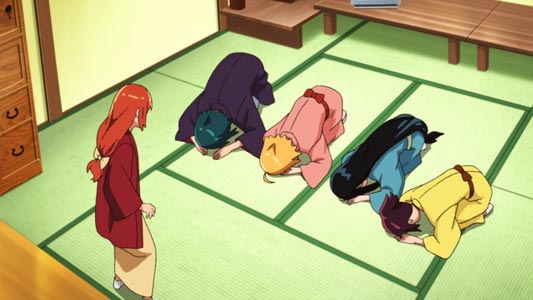
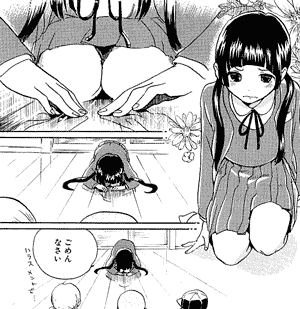
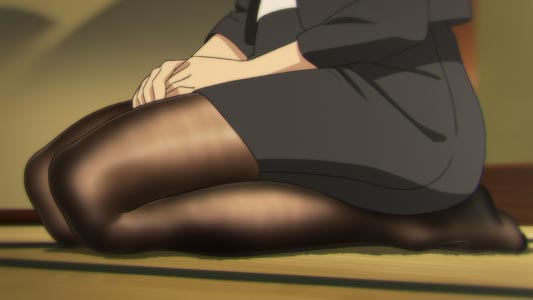
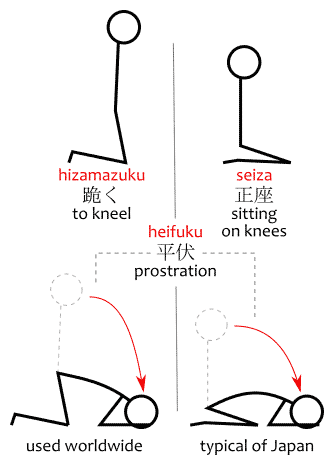
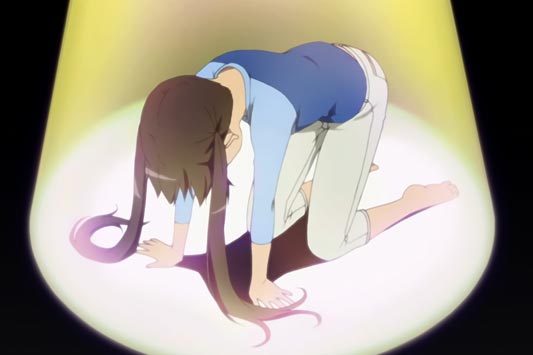
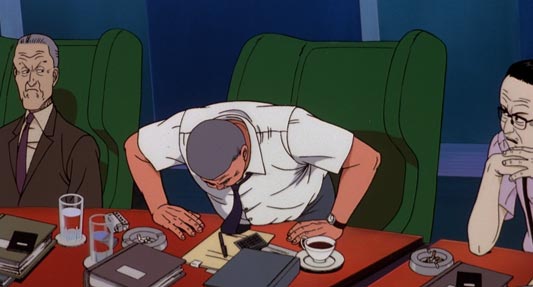
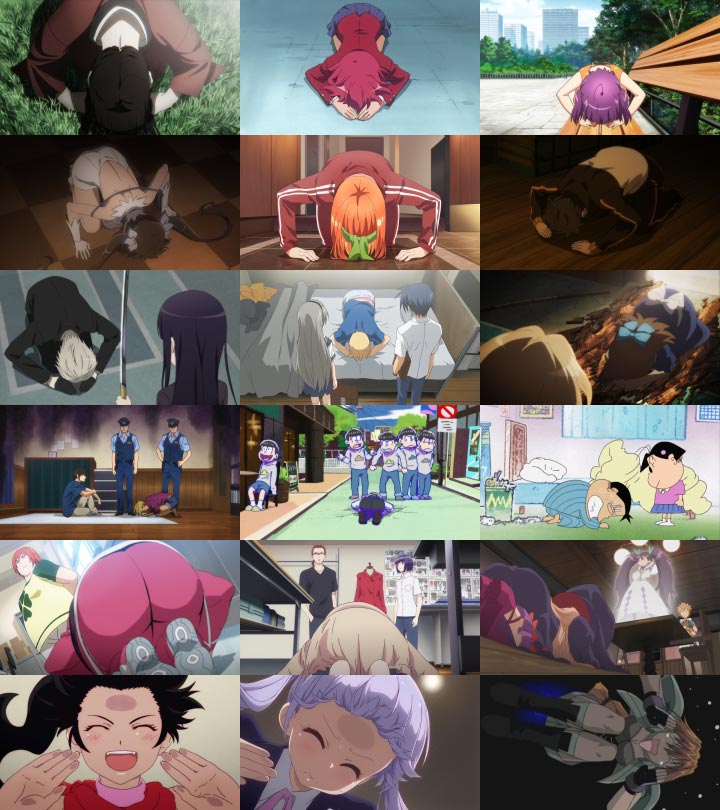
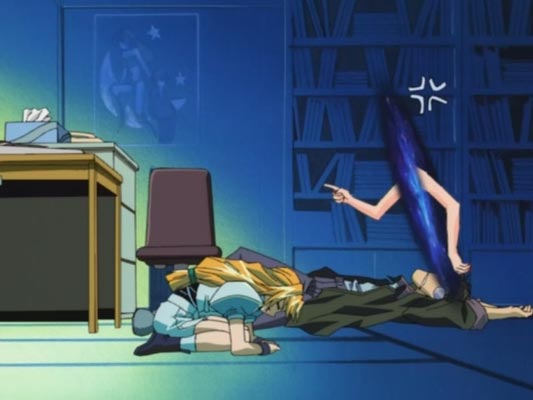
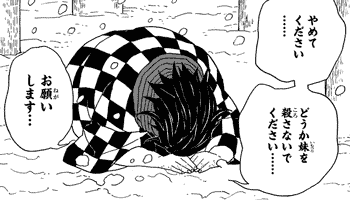
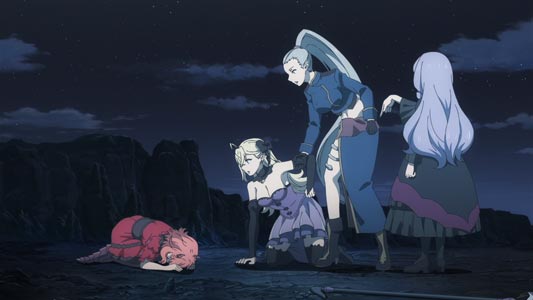
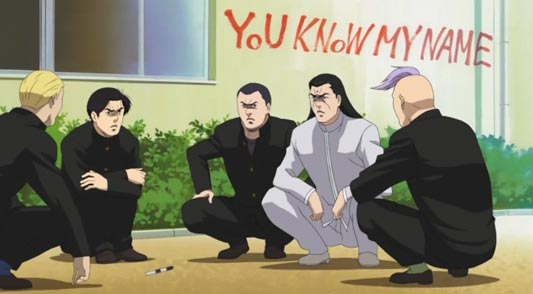
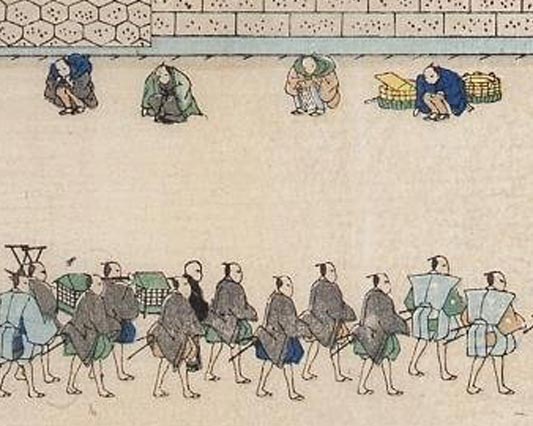
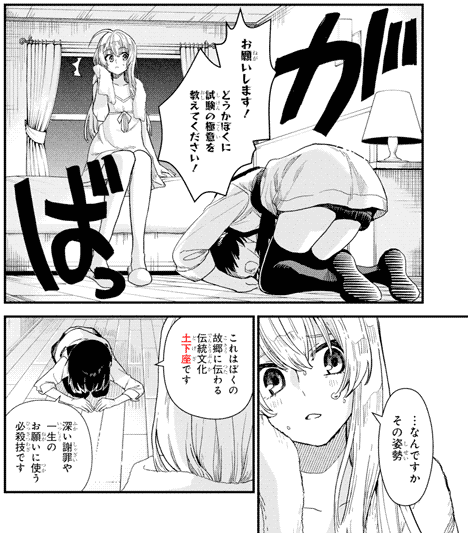
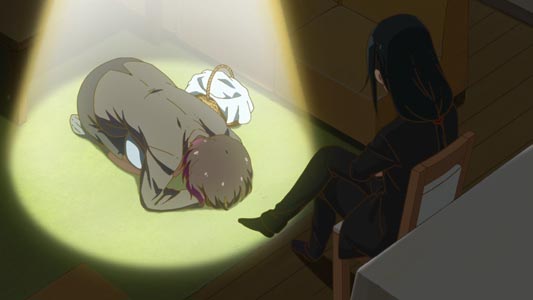
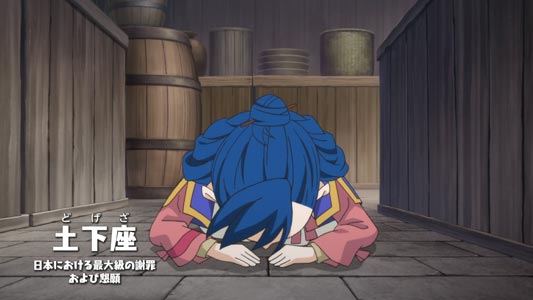
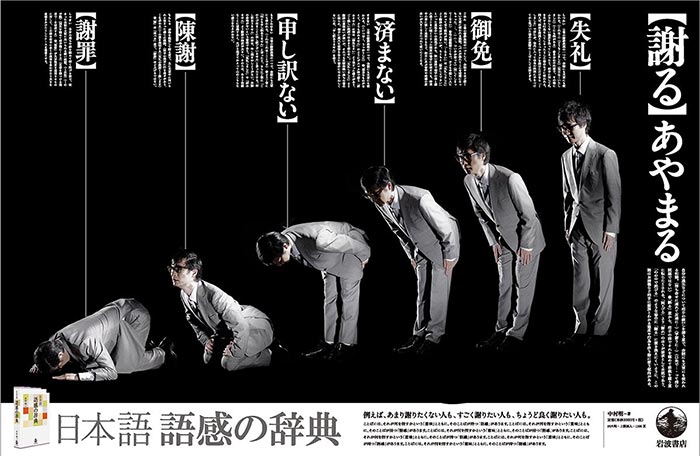
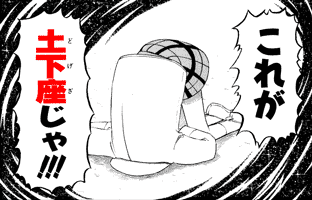
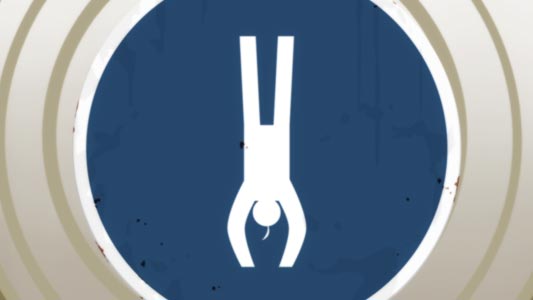
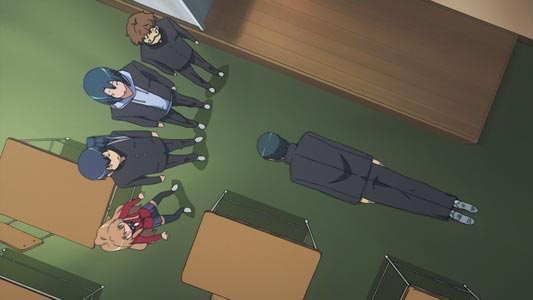
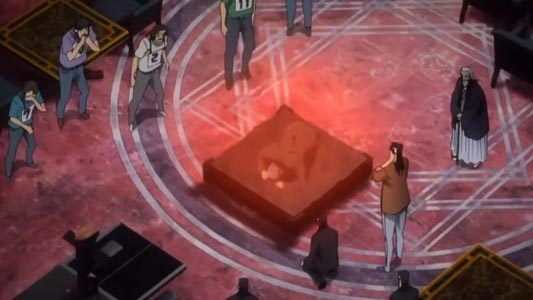
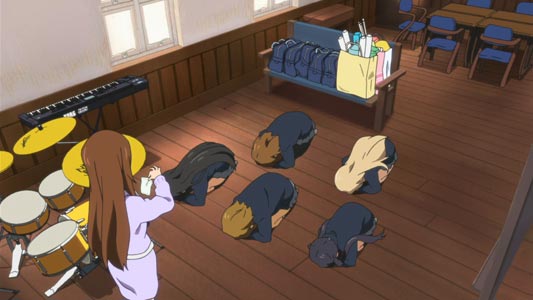
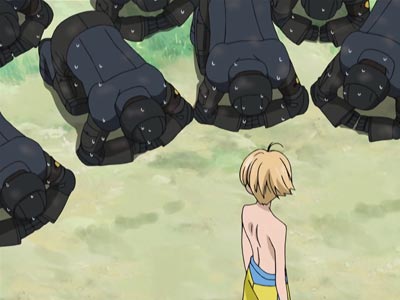
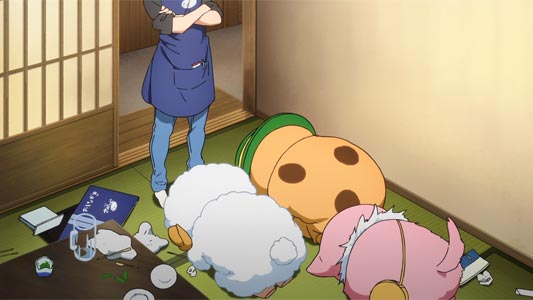
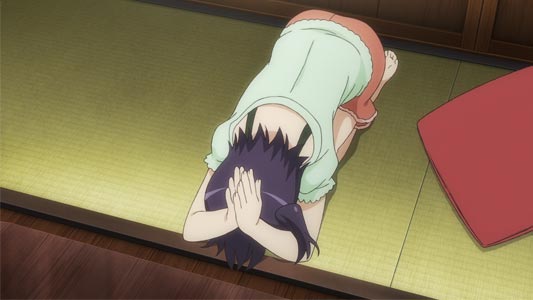
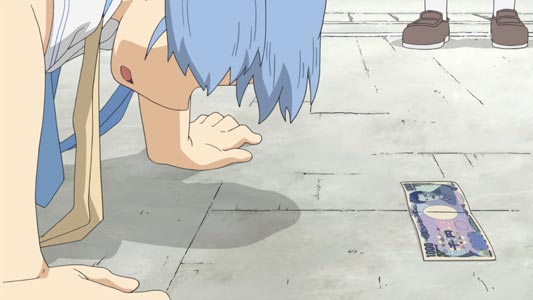
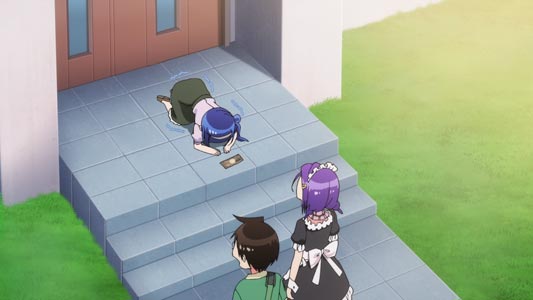
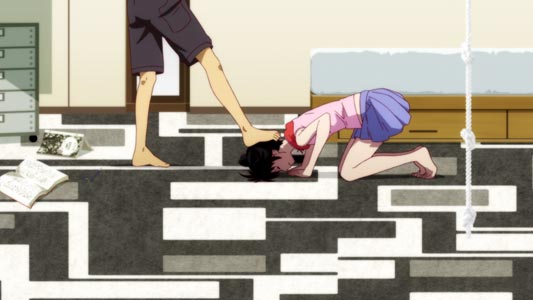
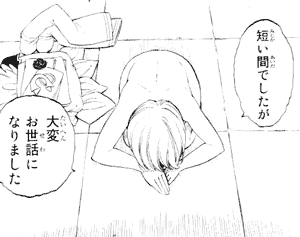
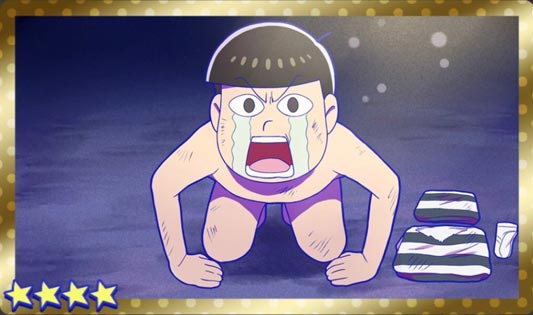
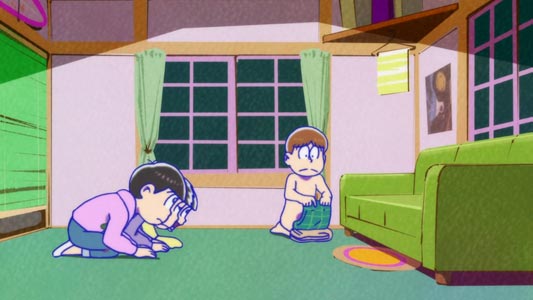
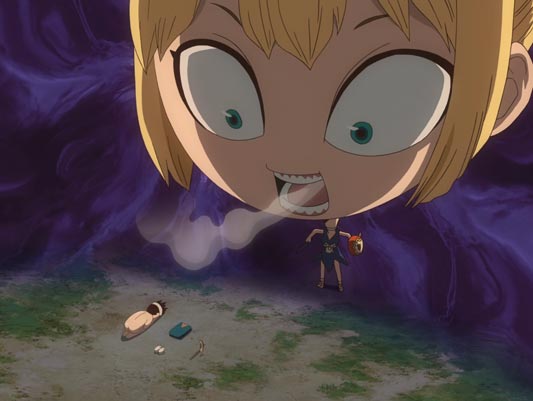
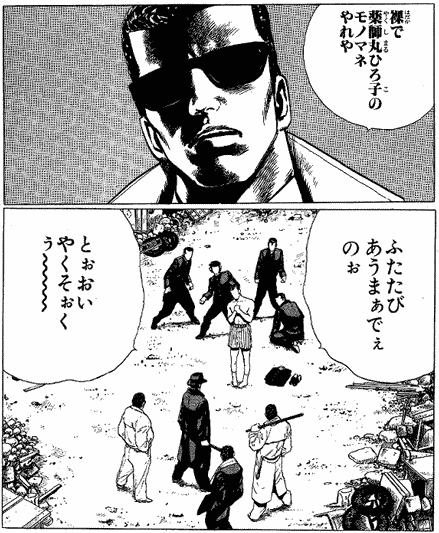
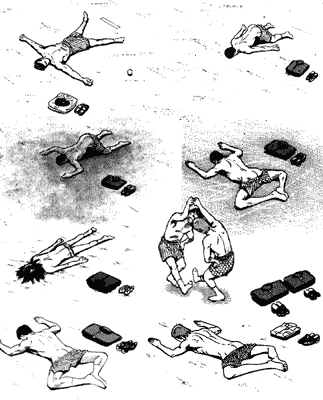
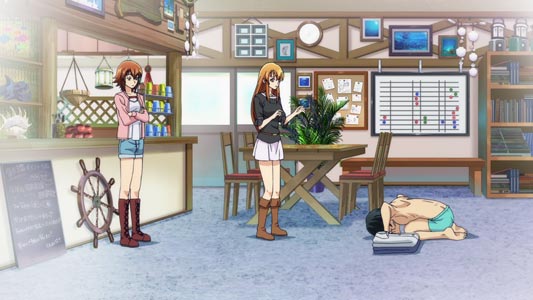
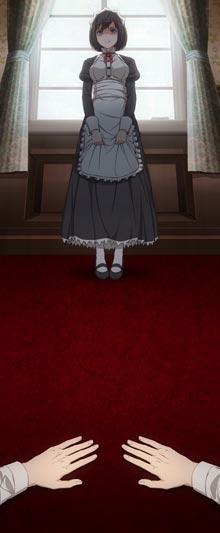
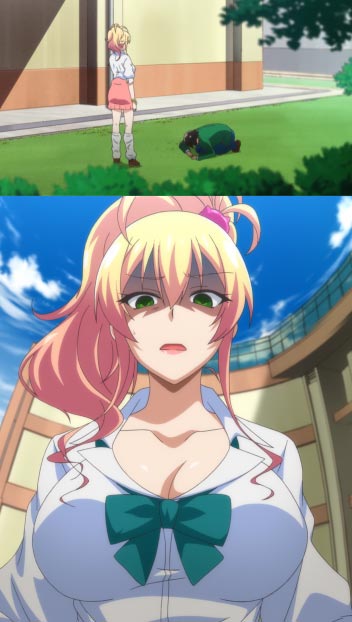
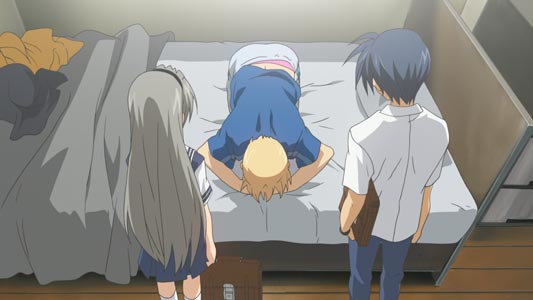
Really interesting; didn't know it could be considered extortion!
ReplyDelete